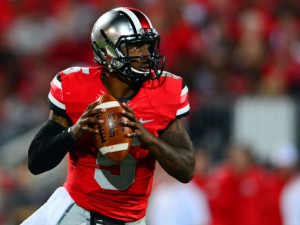
Braxton Miller and the Buckeyes may be left out of the national title game due to their schedule. (Andrew Weber-USA TODAY Sports)
The BCS standings are out, giving college football teams a sense of not only where their program stands, but also the conferences in which they compete.
In order for college football teams to move up in the BCS standings, they have to take care of their own business while hoping their conference brethren is successful, thereby boosting their status.
The catch-22 is at least half of the conference teams must lose weekly and upsets occur, as was the case last week in the SEC when Top 25 teams LSU, Texas A&M, South Carolina, Georgia and Florida all lost conference games.
Coaches can offer coachspeak such as, “We just have to take care of ourselves.” That’s true but other teams they have beaten have to take care of things as well.
Taking that into consideration, here is a ranking of the major conferences that have the most concerns with less than two months remaining in the season:
1. Big Ten – No wonder Ohio State coach Urban Meyer urged fellow conference coaches to up the ante in their recruiting effort to compete against the SEC. His new conference is nothing like his old one.
When he coached at Florida, he knew the talent he coached against weekly would prepare his team for a national championship if the Gators managed to get that far.
The Big Ten lacks BCS punch with Michigan (No. 22) and Nebraska (No. 24) the only teams ranked in the BCS Top 25, other than No. 4 Ohio State. If the Buckeyes win the rest of their games, including a showdown with Michigan in Ann Arbor, it still will not be good enough to top an undefeated Alabama, Oregon and Florida State (or even a one-loss Tide).
Ohio State, out of the NCAA jail this season, could go 25-0 over the last two seasons and not play for a national title in either year.
2. Big 12 – Poor Baylor. The potent Bears (6-0) deserve much better than this. Baylor, which incredibly has scored at least 69 points in five of its six victories, play in a weak conference (for this year at least, with so much quarterback transition), which will inhibit its chance for a spot in the national championship even if the Bears go unbeaten.
After playing at Kansas – a game in which the Bears could reach 80 points – they play three schools ranked in the BCS Top 25 but they are all ranked lower than Baylor. Oklahoma (No. 15), Texas Tech (No. 10) and Oklahoma State (No. 19) must keep winning to boost the Bears’ hopes.
The only problem is all three teams still play against each other and they play non-descript Big 12 teams other than Texas.
The Longhorns are a major player in Baylor’s hopes. The Longhorns end the season hosting Oklahoma State and Texas Tech before playing at Baylor. If Baylor remains unbeaten and Texas (improving and on a three-game winning streak) continues to win until its meeting with Baylor, a Bears victory could push them over the top to a BCS title spot.
3. ACC – If Florida State goes unbeaten the rest of the way, will the Seminoles play in the BCS title game? Not if Alabama and Oregon do the same. If the Seminoles get past unbeaten Miami on Nov. 2 in Tallahassee, Fla., they end the season against Wake Forest, Syracuse and Idaho before traveling to Florida.
The Gators are not ranked in the BCS Top 25, and they have trouble beating quality SEC teams.
If Clemson runs the table, which will include a win at South Carolina, the Seminoles chances are enhanced. Other than Miami and Clemson, the ACC has not much to offer. Virginia Tech is 6-1 and rated No. 14 in the BCS Top 25 but the Hokies’ wins are far from impressive. Their best win is at Georgia Tech, which is 4-3.
It is a real head-scratcher that the ACC has four teams in the BCS top 14 – Florida State (No. 2), Miami (No. 7), Clemson (No. 9) and Virginia Tech (No. 14). That number should dwindle.
4. Pac-12 – Oregon can strengthen its already strong grip on a potential BCS title by defeating No. 12 UCLA and No. 6 Stanford in the next two games. Even if the Ducks happen to lose at Stanford that will be a quality loss and essentially a speed bump if they win out afterward.
Their last three games include matchups against Utah (which beat Stanford) and No. 25 Oregon State at home and Arizona on the road.
That is a much tougher road than Florida State must take in the next few weeks against North Carolina State, Miami, Wake Forest, Syracuse, Idaho and Florida.
Stanford could resurface in the championship discussion if it survives a difficult final month that includes games against Oregon State, Oregon, USC and Notre Dame.
5. SEC – The best conference without question, the SEC has the most teams (six) in the BCS Top 25. That means every week the possibility exists that a loss could happen. Just look at what happened last weekend.
Different from the weaker conferences in this list, a loss is not detrimental. Two losses is the knockout and that could happen against tough competition. That’s the problem facing SEC teams.
But as long as Alabama and Missouri keep rolling along, there’s no question one or the other will represent the SEC in the BCS title game. If either loses once and goes on to run the table, including a win in the SEC title game, they will be more deserving than an unbeaten Florida State or Ohio State team given the level of competition they face week in and week out.
The BCS top four includes No. 1 Alabama, No. 2 Florida State, No. 3 Oregon and No. 4 Ohio State. If those teams comprised the four-team national championship field next season, Alabama and Oregon would be the higher seeds. No. 5 Missouri and No. 6 Stanford would then argue why they were not selected instead of the Buckeyes or Seminoles.
That would be a valid argument.

